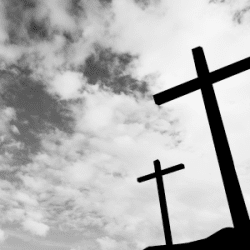But, what about Hades? Hades does have a few loves attested: Persephone is the most well-known, but he also loved the nymphs Minthe and Leuke. No male lovers are attested for him; but, in order to understand Hades's role in queer theological terms, no male lovers need to be suggested or invented for him, either. A large number of Greek myths involving a divine and mortal couple end with the mortal dying (one exception being Zeus's immortalization of Ganymede).
What if Hades was a kind of third interloper in the divine couple's relationship? And, what if he did so not as the jealous and possibly jilted lover, as was the case with Zephyros and the love of Apollon and Hyakinthos, but instead as if he was simply interested in collecting a throng of the most beautiful young male shades he could gather from the Greek nations? Thus he may have wished Hyakinthos, Hylas, Karneios, Ampelos, Narcissus, and many others to join his retinue in the Underworld while they were still young and vigorous and possessed of what seemed like a timeless and eternal physical beauty.
The existence of what we would consider "exclusive heterosexuality" did not seem possible to the ancient Greeks, and it would be expected that everyone would be equal admirers of physical beauty in both males and females. We should thus expect Hades to be no different from the Greek viewpoint, even if he never loved or pursued male lovers. He, and many others, may have had no desire to have sex with males; but, likely as not, he would have enjoyed looking at them just as much as anyone else, and thus for him looking at them in death would have been just as good as looking at them in life. In this way, Hades is not "made queer," but he is made to have a role in a potential queer theology.
Apart from questions of who can do queer theology, and whether or not queer theology is occurring or can occur in a given situation, there are a few other things that I think queer theology should try to keep in mind. These principles will help queer theology preserve its queerness while likewise not making some of the same mistakes as oppressive non-queer theologies. A few of those follow:
- Queer theology should not seek to be isolationist. Certainly, safe space is sometimes needed for queer people to have community, solidarity, and safety amongst themselves (the same way that it is needed for women, racial minorities, and a variety of other socially marginalized individuals), but it should not otherwise purposefully exclude, and should most certainly never degrade, non-queer individuals in the same manner (or even a more neutral or friendly manner!) that mainstream religious groups and their theologies have excluded and denigrated queer people.
- Queer theology should never perpetuate any form of injustice against any group of people on a more widespread and general level. Anything that could smack of racism, sexism, ableism, lookism, or that could even suggest these things as well as others that give priority to positions of privilege on an existential or accidental level, should be avoided like the plagues that these forms of injustice are. At all costs, stereotyping, over-generalization, cultural appropriation, religious and spiritual eschatological condemnation, and ad hominem critiques or dismissals should likewise be avoided whenever possible. (Critique Fred Phelps and his activities all you like, but pronounce no judgments on where he will go after his death, for example.)
- Queer theology should be bold, should not be afraid to ruffle a few feathers where necessary, should always prefer speaking out to being silent, should always prefer doing something to complacency or apathy, and should always attempt to bring informed knowledge to ignorance.
- But, while doing the above, queer theology should also always be respectful and never intentionally offensive or potentially harmful, dignified while not apologetic, courteous and kind in confrontation and correction, utilitarian in its actions rather than simply showy or self-justified, and intelligently informed rather than myopically opinionated.
- Queer theology should offer options, not orthodoxies, and possible solutions, not absolute directives.
- Queer theology, like all praxis-based and liberation-type theologies, is experiential, and thus sensitive to the actual lived personal and spiritual experiences of the people who enact it, as well as the lived experiences of others with whom it comes into contact. Thus, it should listen as well as talk, should be inclined toward solidarity and alliance with other individuals and groups who struggle, and should be open to questioning from others as well as intensively self-questioning (while not becoming cripplingly paralyzed with over-self-evaluation). Empathy and sympathy are encouraged; speaking of or for others when they are able to do so for themselves is not.
- The Silver Rule—don't do to others what you don't want done to you—is a good general ethic; the Golden Rule, however, is not, because one can't be certain that others would enjoy impromptu foot massages in public as much as oneself does.





